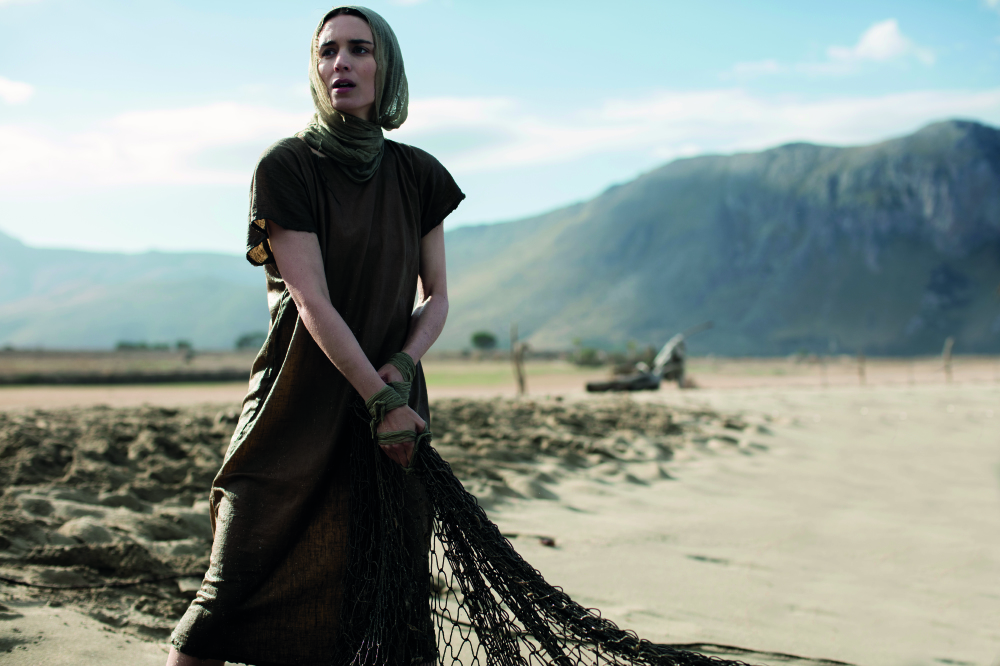Mary Magdalene is indisputably one of the most enigmatic and fascinating female figures in history, remaining an endless source of inspiration for literature, film, theatre, and television. That’s why this week, Universal Pictures will be releasing their compelling new feature Mary Magdalene, starring Academy Award nominees Rooney Mara, Joaquin Phoenix, and Chiwetel Ejiofor, in a moving and authentic portrait of the fascinating spiritual figure.

Rooney Mara stars in the titular role of Mary Magdalene
The biblical biopic tells the story of Mary (Mara); a young woman in search of a new way of living. Constricted by the hierarchies of the day, Mary defies her traditional family to join a new social movement led by the charismatic Jesus of Nazareth (Phoenix). She soon finds a place for herself within the movement and at the heart of a journey that will lead to Jerusalem.
In celebration of the film’s release, we’ve selected some of the most significant women in history whose compelling stories live on to this day, much like Mary’s. We’d love to see biopics of these brilliant women up on the big screen in the future!

Joan of Arc
With no military training, Joan convinced the embattled crown prince Charles of Valois to allow her to lead a French army to the besieged city of Orléans, where it achieved a momentous victory over the English and their French allies, the Burgundians. However after seeing the prince crowned King Charles VII, Joan was captured by Anglo-Burgundian forces, tried for witchcraft and heresy and burned at the stake in 1431, at the age of 19. By the time she was officially canonized in 1920 (!) she had long been considered one of history’s greatest saints, and an enduring symbol of French unity and nationalism.
Elizabeth I
She was the daughter of one of the most feared Kings to ever sit on the throne of England – and a Queen whose fierce intellect and courtly charms split the church in two. Elizabeth would become one of England’s longest serving monarchs (she ruled for 44 years) and would restore stability, defining her reign so effectively we now refer to it merely as ‘Elizabethan’. She did so without a man by her side. Instead, Elizabeth declared she was married to her kingdom, referring to her subjects once in 1599 as ‘all my husbands, my good people’. Over the decades she would become as feared and revered as her father, Henry VIII, with Pope Sixtus V declaring: ‘She is only a woman, only mistress of half an island, and yet she makes herself feared by Spain, by France, by the Empire, by all’.
Mother Teresa
Mother Teresa, known in the Catholic Church as Saint Teresa of Calcutta, was an Albanian-Indian Roman Catholic nun and missionary. Teresa decided early in her life that she had a religious vocation to serve the sick and poor, and went to India to serve. Her order established a hospice; centres for the blind, aged and disabled; and a leper colony. She won the Nobel Peace Prize in 1979 for her work. In December 2015, Pope Francis recognized a second miracle attributed to Mother Teresa, clearing the way for her to be canonized on September 4, 2016.
Cleopatra
There are many misconceptions about Cleopatra. First and foremost, She wasn’t Egyptian. She was a Macedonian. She is also known to be a great beauty, personified by actresses such as Vivien Leigh and Elizabeth Taylor. The only proof we have of her appearance are ancient coins which indicate a fairly large, hooked or beaky nose. However, what is unequivocally agreed is that she was captivating. She had great love affairs with Julius Caesar (who made her Queen of Egypt) and Mark Anthony who famously abandoned his duties to be with her.
Emmeline Pankhurst
As synonymous with women’s suffrage as the word ‘suffrage’ itself, in 1999 Time magazine named Emmeline Pankhurst one of the 100 Most Important People of the 20th Century, saying: ‘she shaped an idea of women for our time; she shook society into a new pattern from which there could be no going back.’ In 1903 Pankhurst co-founded the Women’s Social and Political Union (WSPU) with a clear agenda focused on direct action to win women the vote. ‘Deeds not words, was to be our permanent motto’, she would later say. These words soon rang true. It was at Holloway Prison that Emmeline Pankhurst would stage her first hunger strike, withstanding violence and abuse to enable all women the right to vote.
Lady Godiva
Godiva, Countess of Mercia (died between 1066 and 1086), was an English noblewoman who, according to a legend dating at least to the 13th century, rode naked – covered only in her long hair – through the streets of Coventry to gain a remission of the oppressive taxation that her husband imposed on his tenants. The name "Peeping Tom" for a voyeur originates from later versions of this legend in which a man named Thomas watched her ride and was struck blind or dead.
Indira Gandhi
ndira was the first female prime minister of India. She was in power from between 1966–77 and 1980–84. Accused of authoritarian tendencies she only narrowly avoided a military coup by agreeing to hold an election at the end of the “emergency period” of 1977. She was assassinated in 1984 by her Sikh bodyguards, in response to her storming of the Golden Temple
-
Mary Magdalene is released in UK cinemas this Friday, March 16 from Universal Pictures.
Tagged in Joaquin Phoenix Rooney Mara

